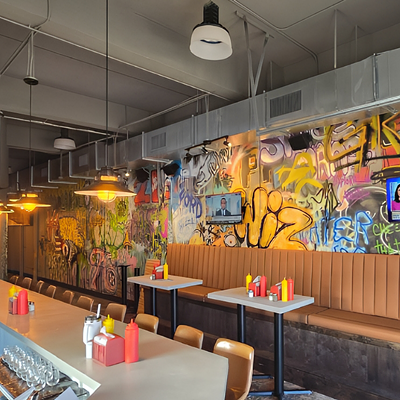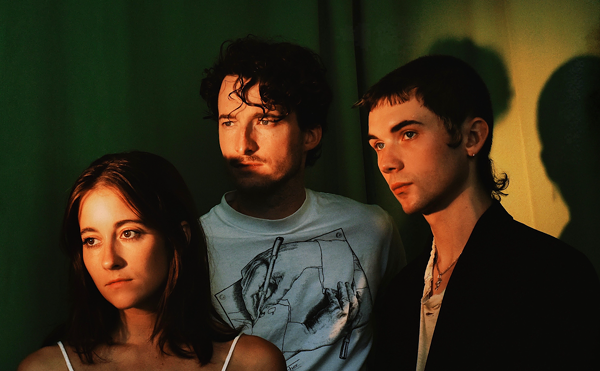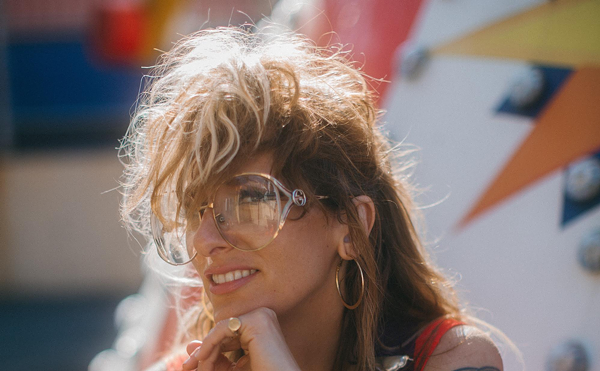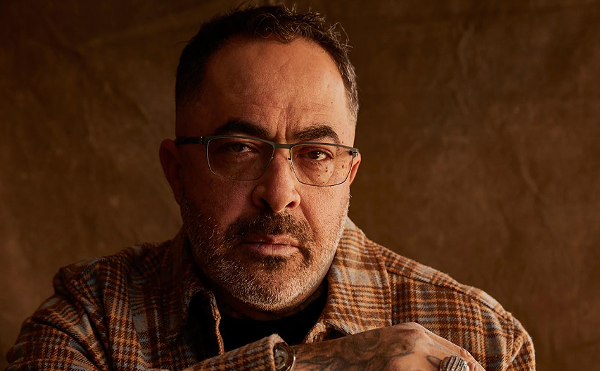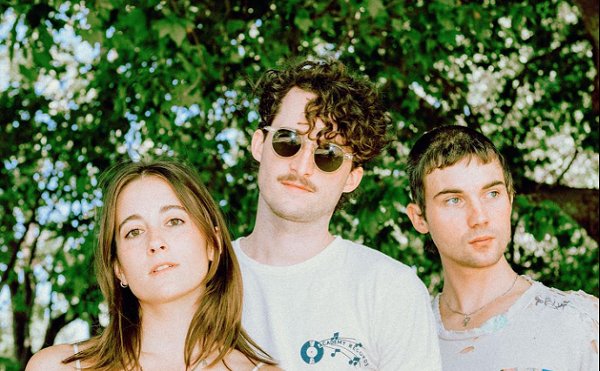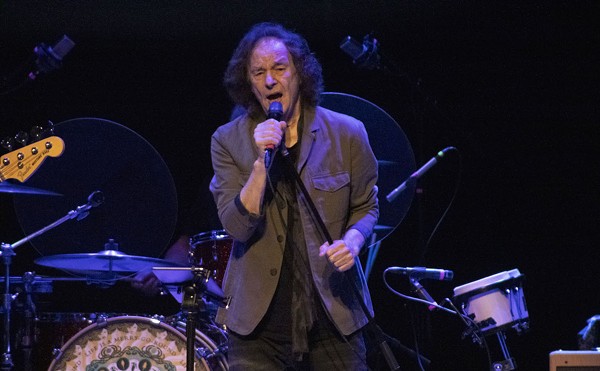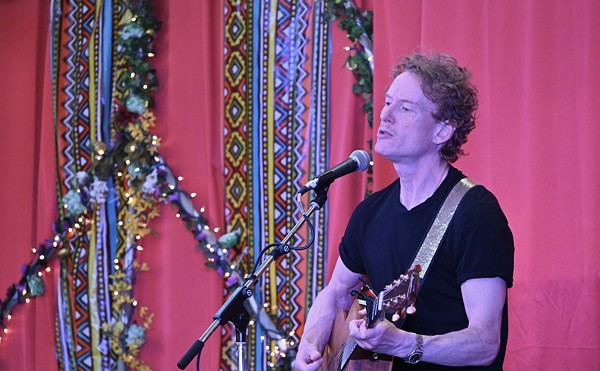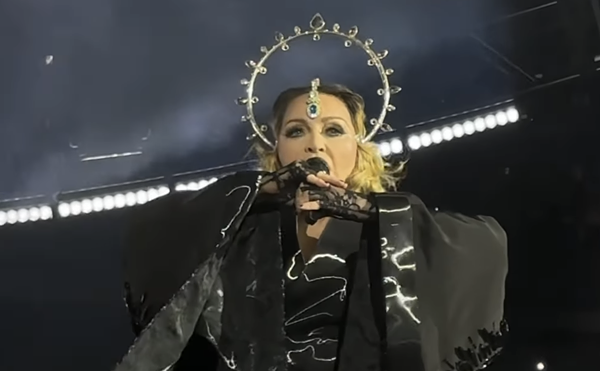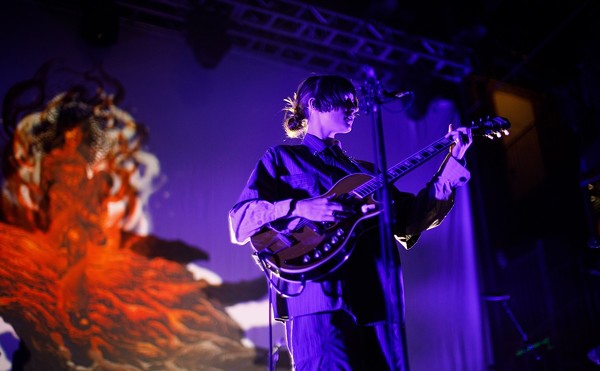Kevin Barnes is the high priest of intellectually stimulating, cleverly cheeky pop culture-infused lyricism, an idiosyncratic self-trained musical genius who serves as the visionary frontman of Athens, Ga. electro-lush glam rock and psyche pop outfit, of Montreal. The band released a Top-10-of-the-year worthy LP in 2010, False Priest, which found them fully exploring their funkadelic and R&B tendencies along with pumping up the richness of their sound with help from producer Jon Brion (Kanye West, Fiona Apple).
I had the pleasure of chatting with Barnes several weeks back while he was taking a break before gearing up for the next leg of the band’s False Priest tour. Check out our lengthy conversation below along with various videos for songs off the new album.
Leilani: So how are you doing? You enjoying some time off? Or is there really any such thing as time off for Kevin Barnes?
KB: Yeah, I’ve been getting some recording done. It’s been good. I feel lazy if I don’t do anything, just sitting around seems like a waste of time.
How have the False Priest tour dates been so far? I know you played some international dates ...
Yeah, it was great, it was definitely one of the most successful tours we’ve ever done, on every level. We also recently went to Mexico and we went to Brazil, before that we went to Europe. We’ve kind of been all over the place.
Were these your first dates in Mexico and Brazil? What’s it like playing down there?
It was our first date in Brazil, but we'd played one other show in Mexico. The first time we went down there, actually, it was sort of under dubious circumstances because we were playing this festival — it was a massive festival [Corona Music Fest] — but we were playing a smaller stage. And the festival was actually in a soccer stadium that was, if it’s not the biggest, then definitely one of the top five largest soccer stadiums in the world. Just massive. But we weren’t there, we were in the parking lot, one of the side stages in the parking lot of the giant soccer stadium.
Most of the kids were there to see NOFX. So they didn’t want to see us at all, you know? And they were really insane and it was crazy weather, pouring down rain, and these kids were really into the whole punk rock thing and the role-playing of “Oh, we’re so punk rock, we hate everything,” so they were spitting at us and throwing shit at us. It didn’t bother me because it was so surreal and so cinematic in a way, you know? It was definitely an extraordinary experience.
We went back a couple weeks ago and played a proper show in a venue, and we were the headliners. And that was great. We got to really connect with people who were on our side. So that was nice.
Do you find that your overseas fans respond differently to your music, or are there certain songs they respond to more enthusiastically?
I think we’ve been sort of spoiled because our U.S. fans are really amazing, it’s not like we're coming from this uptight place and then going to these other places where people are less uptight.
But sometimes we feel like, in a weird way, we are an American band that seems to make sense more to Americans than we do to people in other countries. But one thing that does seem true is when you go to other countries, people don’t have to know the material to get into it, they’re naturally inclined to dance and they want to dance and celebrate and have fun. When they see a band, as long as the band is giving them something that they can work with, they will be very supportive and vocal about it.
\\<\/iframe\>
I guess if you put on a good show people will like it regardless of what you’re doing as long as the music is good and the entertainment matches the quality of music…
It’s kind of cool to go places where maybe you haven’t been before, and maybe your records aren’t really available or widely available, and you have to really sort of get by on the talent, or the presentation, or whatever it is you’re putting forward. You really have to have your shit together in order to put something across that’s positive for people.
Sometimes it’s easy, if the fans are there to see you and they know the material. You can’t really lose unless you’re just completely wasted and can’t even function or can’t stand up or whatever (laughs). As long as you can, like, do your thing, then people are going to like it and it’s fine. But it’s kind of an interesting challenge to go places where you don’t really know if they know you, and they don’t really have the context to understand you, but they can still get into it.
Let’s talk a little about False Priest. I know you’ve said in interviews that it was pretty much complete when you brought it to producer Jon Brion. What motivated you to work with him?
I had only worked in my home studio and I’ve only worked in bedroom studios my whole life, so I’ve never really been to a real classic studio and worked with anyone who had a track record like Jon’s. So it was really me wanting to go and see how real records are made, rather than what I considered my little bedroom project. And I was really intrigued by going to Ocean Way, where Frank Sinatra used to record, and all sorts of other crazy people over the years, and then working with Jon, who’s a genius, a total icon. I knew I’d learn a lot and I did. So it was great.
What ultimately convinced you to incorporate more live instrumentation on this album?
The live drums was sort a of a semi-new thing – the last couple years have been more drum programming and loops. I’ve kept a lot of the drum programming, then also integrated live drumming onto the tracks as well. But the main thing is instead of using the software versions of synthesizers, using the actual synthesizers.
Jon has an incredible collection of vintage synthesizers, vibraphones and the most incredible collection of musical instruments you could ever imagine. We had so much at our disposal. He’d listen to something I made just using my computer software, piecing it together myself like that, and he’d go, “Oh, you want to use a Mellotron sound, or that Chamberlin sound? I have an actual Chamberlin. We can just plug it in and replace it with that.”
We did that a lot, replacing software versions with their actual physical instrument. And then the big thing, too, was mixing, ’cause I’d always just mix it myself, but Jon has an engineer that he works with and he pretty much mixed the whole thing. I was there with him and made some suggestions, but he was the one moving the faders and turning the knobs. That was cool, too. To have someone else I respected mixing it, after it was all said and done, was really great for me. I kinda just looked at it as an education …
It seems like you go through a different stage of creativity with each album. How did your creative process work and evolve into what became False Priest?
A big thing for we was meeting the Wondaland Arts Society, which is the art collective that Janelle Monáe is part of. I met them in Atlanta after a Skeletal Lamping show and we started hanging out. One of the guy’s in the collective, Chuck Lightning, he and I became really good friends and he turned me on to a bunch of different things I hadn’t really explored very much, like the whole P-funk scene and a lot of science fiction writing and things like that. I owe a lot of that inspiration, that spark, to Chuck and meeting those guys. It was great because they were working on the Arch Android, Janelle’s record, at the same time and we would kind of email each other, works in progress. Getting their feedback and support was very important to me.
I know she’s on the album, specifically one of the songs I wanted to talk to you about, “Enemy Gene” – how did that song come about?
The creative process has always been a bit of mystery to me, it’s sort of this unconscious evolution. I just sort of sit down at piano or guitar or whatever it is, and it sort of happens in this organic way, and I just sort of let it happen, and whatever it is, if I’m laying down the music first, I’ll listen to it a bunch of times and figure out what I want to sing about here. I have a journal that I keep all my lyrical ideas in, so I’ll go through the journal and see if I find something that seems to fit or that has some sort of glow to it, like, oh, that’s the direction I should be going in. You know? And then I sort of piece it together. All of this really happens very organically and very mysteriously.
But getting Janelle to sing on it … once I discovered what an incredible vocalist she was and how versatile she was, I got to a point where I wanted her just to sing on every track – basically I wanted make a Janelle Monáe record. But you know, I couldn’t be too greedy.
We actually wrote that song “Our Riotous Defects” as a duet. It was sort of like a he-said she-said – she took the second verse, and we had a whole separate verse that she sang that was more from the female perspective. But it kind of became too campy, so we shelved it. It might be available via iTunes [it is on the Deluxe Version of False Priest]. That was the original idea. But after we shelved that, we ended up getting her to sing on “Enemy Gene.”
\\<\/iframe\>
You’ve been known to take autobiographical experiences and incorporate them into your songs. How much would you say what you’re writing these days is inspired by things that have happened to you as opposed to things you’ve made up or things that have inspired things you’ve made up?
It’s definitely something I’ve been thinking about a lot lately. I think, maybe about 50 percent, it’s sort of split. A lot of the stuff, maybe it didn’t actually happen, but I don’t really differentiate that much between what physically happens or what just happens in my mind. In a way, it like, if it happens in my mind then it’s just as real as if it happens in real life.
Also, I think about music and I think about the things I sort of identify with and writers I identify and the writers a lot of other people identify with, are the ones that speak, for the most part, from personal experience, and it just feels more real and more emotive and in a way, more fulfilling to hear stuff like that because it has a universal appeal to it. Someone like John Lennon, for example, and the Plastic Ono Band, it’s one of the best examples of that, just completely raw and coming straight from his heart, straight from his soul. That’s something you can’t really do on every record, necessarily, but those are magical moments in music, and we’re lucky to have a few. It’s something I’d like to do more and I think I’m getting in a state of mind where I can do it a little bit more. Because you do have to put yourself in this vulnerable position and really not think about the outside world – at least for me, anyway, it would definitely throw me off. If I think about someone writing about it, commenting on, hearing it, even, then it takes me about of that space that you need to be in where you’re just unconsciously doing this thing, stripping it directly from your psyche and not conscious of it. Otherwise, you might just become too self-conscious to even do it. I think you have to be unconscious in that in that way – you’re speaking to god, or whatever, you’re speaking to something that isn’t necessarily human…
I know you guys have another outrageous stage production put together for this tour. What is different on this tour from your last big album tour as far as what’s happening on stage?
When we were putting the False Priest show together, my brother [multi-media artist David Barnes] and I were talking about our vision. The Skeletal Lamping show was basically just a collection of all these theatrical moments and they weren’t really connected at all – we’d have this Old West barroom brawl break out during one song, a creepy religious figure molesting little kids or something in another, and then we’d have this guy getting harassed by John McCain dolls, then hanging himself, and then getting covered in blood in some Aztec ceremony. Randoms ideas that we created and threw together.
So for False Priest, we thought it’d be cool if it was more thematic and everything had a narrative to it, that maybe wasn’t completely linear, but the parts connected together, so felt more like a contrived piece of work. And we actually tried that for the first couple shows, but it became almost a bit Spinal Tap (laughs). It wasn’t the way we envisioned it in our heads, it just came off in this awkward, sort of pretentious silly way. So then we just said, fuck it, and abandoned it and we were like, we’ve got all these components, we’ve got all these costumes and all these props, and everything, so what are we going to do?
So we tried to make it more playful and fun. I think we always just naturally gravitate towards that anyway, and any time we try to be too ambitious in creating some sweeping epic in our mind, it never really comes across. It’s always better if we have fun and do things spontaneously. And when you’re doing something night after night after night, even if it’s a complicated thing where you have lots of roles to play, it can still become mundane. To have that freedom, where you don’t have to follow any script, is very important.
It’s kind of funny, too, though, with the theatrics, because you realize that one certain theatric works really well with this specific song, but if you tried to do it on another song, it’d be awkward and just wouldn’t work. So a lot of times the theatrics actually sort of determine what the setlist is going to be.
So what’s next? I know you guys have an EP with some more material from False Priest on the way …
Yeah, that’s going to come out in April. It’s called The Controller Sphere. I’m really excited about it. It’s only five songs but there’s some different material, it’s sort of new territory for us, a bit noisier, a bit artsier. Just kind of bizarre stuff. But that’s done. And like you said, I’m not gonna take a break, so I’ve been working on more new material, working on some new projects, and I’m sort of in a transitional stage right now trying to figure out what I want to do next. I’ve made so many records by now, I’m trying to figure out if I should do should do something different, involve different people, to figure out different things I want to do, but still writing and exploring…
\\<\/iframe\>



